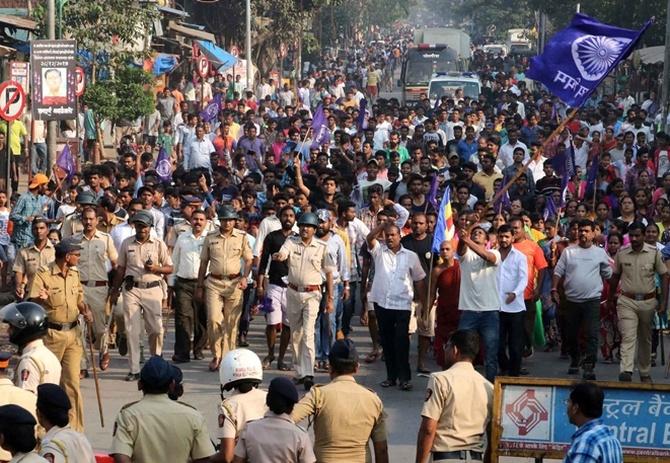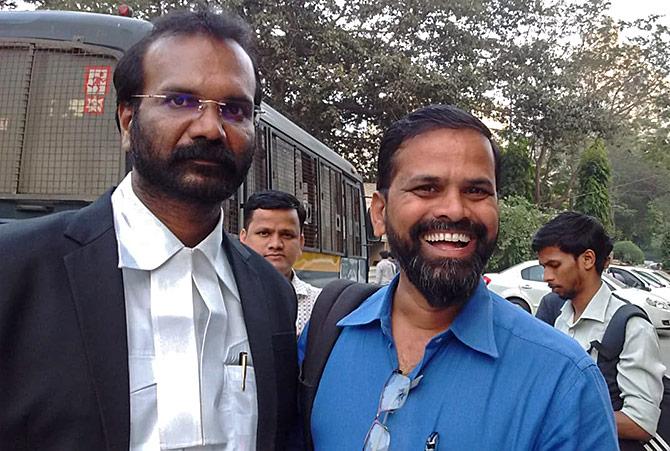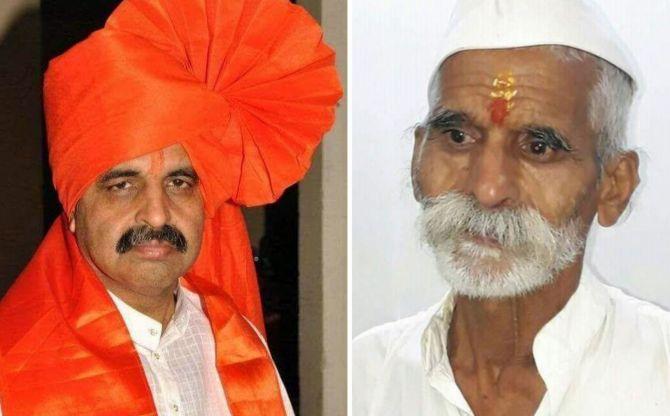The reasons for the snail's pace at which the commission is proceeding are linked both to the government's indifference to it as well as the indifference of the parties appearing before it.
Jyoti Punwani reports from the Bhima-Koregaon judicial commission hearings in Mumbai.

Only one witness testified over the four days that the Bhima Koregaon Judicial Commission held hearings in Mumbai last week, and his deposition was left incomplete.
The commission was given its second extension early this month. Its term has now been extended till May 8.
Chances of the Commission completing its task before that seem dim, given that 110 affidavits have been filed by the State alone.
The reasons for the snail's pace at which the commission is proceeding -- only three out of 10 witnesses who have appeared before it have completed their depositions -- are linked both to the government's indifference to it as well as the indifference of the parties appearing before it, and of their lawyers.
Among the parties represented before the Commission are the Vivek Vichar Manch, a Hindutva think-tank; Milind Ekbote, ex-BJP corporator and one of the two main accused in the first information report filed for the Bhima Koregaon violence, and individual Dalit victims.
Veteran lawyer B A Desai was representing Congressman Sanjay Lakhe Patil when the commission began. In the two initial sessions in Mumbai held in September, Desai's cross-examination exposed the government on many counts.
But the Congress no longer seems interested in carrying on with this exercise: Desai has not appeared after September.
Even Bharipa Bahujan Mahasangh chief Prakash Ambedkar, who had called a bandh to protest the violence at Bhima Koregaon, has shown no sense of urgency before the commission.
Ambedkar made his first appearance before the commission only in its second session of hearings in Mumbai that began on September 24. He filed applications which were rejected by the government. He is yet to start oral arguments on the same.
One of Ambedkar's applications asks for government witnesses to be cross-examined first, whereas the commission has decided that private witnesses will depose first. Only after their version is heard will government witnesses depose.
By the time Ambedkar makes his arguments, the evidence of 10 private witnesses would already have been underway.

The tenth witness, Ravindra Chandane, whose deposition took up all the four sittings of the commission last week, is slated to appear again on January 28 when the Commission sits in Pune. However, it is not sure whether his cross-examination will be resumed.
For the four witnesses who have been called to Pune for the week-long session beginning January 28, have to first pick up from where they left off.
The main reason for this slow progress lies in the composition of the commission. While a retired judge -- Justice J N Patel - heads it, the second member is Maharashtra's Chief Information Commissioner Sumit Mullick. This assignment eats into his working hours.
So, in Mumbai, the commission sits for only three hours, from 3 pm to 6 pm. It has so far held hearings on 23 days in Mumbai.
In the first week that the hearings began in Mumbai, the commission carried on till 8 pm. However, that enthusiasm lasted just for that week.
In contrast, last week, on two days, the proceedings wound up an hour early, at 5 pm.
The first time this happened was because advocate Vijay Sawant, representing the Vivek Vichar Manch, had received the material submitted by the witness too late to prepare himself.

Sawant had expected advocate Niteen Pradhan, representing Milind Ekbote, to cross-examine the witness before he did. However, Pradhan did not turn up that day, so Sawant had to start the cross-examination.
The second time the commission finished an hour earlier than scheduled, was because counsel for the government, Shishir Hiray, didn't want to start what was going to be a lengthy cross examination at 5 pm.
The commission hearings last week were originally supposed to go on till January 19. But it was unanimously decided to curtail them by a day.
Had that not been done, Chandane's cross examination would have been over by the end of January 19.
In the same way, the commission need not have wound up at 5 pm. Since the list of witnesses is put up at the commission's office well in advance, lawyers can easily approach the witnesses concerned to get hold of their affidavits and other material submitted by them.
Justice Patel has made it clear that the commission has no funds to provide copies of all affidavits filed before it to the lawyers appearing before the commission. Lawyers are free to read the affidavits in the commission's office and make copies.
While Chief Minister Devendra Fadnavis announced the setting up of a judicial commission on January 2, 2018 itself, the day after the violence at Bhima Koregaon, the government has done little to see that it is fully equipped.
The government's budget for this commission is said to be Rs 52 lakh (Rs 5.2 million). It has employed a counsel for the commission (Ashish Satpute) and for itself (Shishir Hiray); a registrar (retired district and sessions judge V V Palnitkar), two stenographers (Pritam Uttekar and Ravindra Bokil) and a peon (Khamkar).
But no funds have been spent on office space.
The commission functions from the premises of the State Information Commission. The hearings are held in a tiny room where only 20 persons can be seated. Journalists and lawyers have often had to stand through the proceedings.
Though the proceedings of judicial commissions are open to the public, lack of space has made the Mumbai proceedings of this commission exclusive. Only lawyers and journalists attend it, and sometimes, individuals closely connected to the event.
Originally, the World Trade Centre at Cuffe Parade was chosen as the venue for the commission. But that was seen to be too inaccessible for the majority of witnesses.
However, in Pune, where the commission has sat for 9 days, the hearings are held in a big hall on the first floor of the Zilla Parishad building. A television displays the deposition as it is being typed on the computer.
The space there allows the Pune hearings to be public. Many Dalit activists have been turning up for the hearings.









 © 2025
© 2025